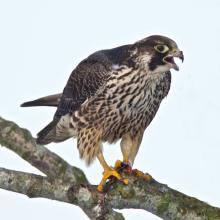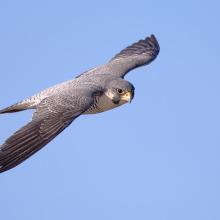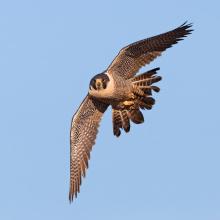

Join BirdNote tomorrow, November 30th!
Illustrator David Sibley and actor H. Jon Benjamin will face off in the bird illustration battle of the century during BirdNote's Year-end Celebration and Auction!
Peregrine Falcons were once wiped out along the Eastern seaboard. The culprit was DDT, a pesticide that weakened the birds’ eggshells. DDT was used from the 1940s until it was banned in 1972. Nest boxes, like those in Boston’s Custom House Tower, have been crucial to the remarkable recovery of these birds. In fact, Peregrines have bounced back particularly well in cities, including Boston, New York and Chicago.
BirdNote®
The Peregrine Falcons of Boston
By Daniel Ackerman
Boston’s Custom House Tower soars 500 feet above the urban clatter of cars and concrete.
David Paulsen: Little bit of a steep climb...
Biologist David Paulsen leads me to the top of a spiral staircase at the tower’s pinnacle. He proudly points to a wooden box built into a window opening. To me it looks like a standard chicken coop. But Paulsen sees it a bit differently.
Paulsen: This is kind of like the Taj Mahal of Peregrine Falcon boxes here.
Complete with insulated walls and a gravel-lined floor, since 1987 this is where numerous Peregrine pairs have raised and fledged 99 chicks.
Paulsen: Probably the most productive site in all of New England.
Which is good news, since Peregrine Falcons were once wiped out along the Eastern seaboard. The culprit was DDT, a pesticide that weakened the birds’ shells, and that was used from the 1940s until it was banned in 1972.
No one’s home in this nest box right now, but the scattered bones and feathers show this is a prime perch for hunting.
Paulsen: Blue Jays, cuckoo, woodcock…got some waxwing here.
Paulsen oversees Massachusetts’ Peregrine monitoring program. And he says nest boxes — which protect the eggs and chicks — have been crucial to the remarkable recovery of these birds. In fact, Peregrines have bounced back particularly well in cities, including Boston, New York and Chicago.
Paulsen: They can handle the day-to-day noise, construction. And now they’re found throughout. On rooftops, bridges, skyscrapers. Really everywhere.
Human-made structures mimic the cliff-top sites where Peregrines typically nest.
The concrete jungle may not seem like critical bird habitat, but for Peregrine Falcons…
[Peregrine Falcon ML137573]
…it’s home.
For BirdNote, I’m Daniel Ackerman.
###
Producer: John Kessler
Production Manager: Allison Wilson
Editor: Ari Daniel
Producer: Mark Bramhill
Associate Producer: Ellen Blackstone
Field recording by Daniel Ackerman
Bird sounds provided by The Macaulay Library of Natural Sounds at the Cornell Lab of Ornithology, Ithaca, New York. Peregrine Falcon recorded by Gerrit Vyn ML137573
© 2020 BirdNote November 2020 Narrator: Daniel Ackerman
ID# PEFA-09-2020-11-07 PEFA-09







